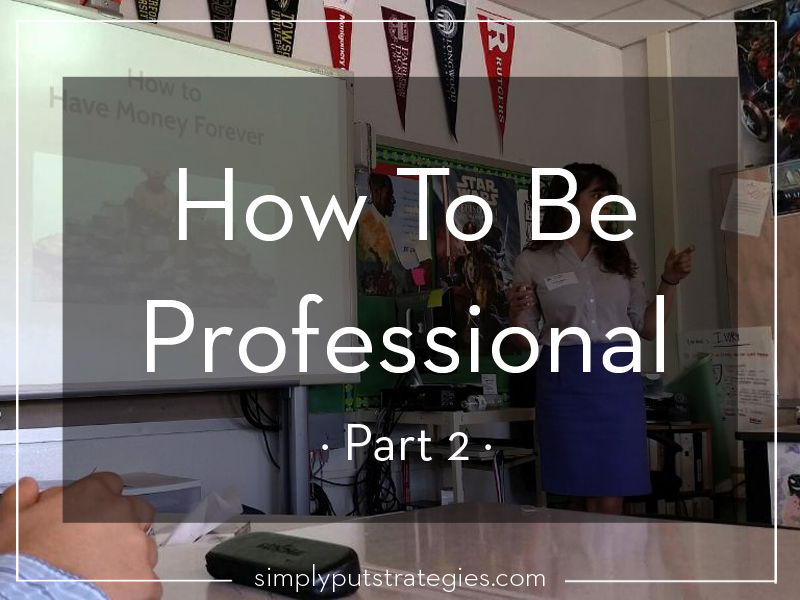 Being professional doesn’t come easily to everyone. Colleagues aren’t necessarily good models, and there are many “professional” behaviors that no one tells you! Whether starting your first job, a new job, or your own thing, consider the following to keep it professional:
Being professional doesn’t come easily to everyone. Colleagues aren’t necessarily good models, and there are many “professional” behaviors that no one tells you! Whether starting your first job, a new job, or your own thing, consider the following to keep it professional:
Create Systems:
It’s likely that your work involves doing similar tasks. Use checklists and templates to catch your mistakes and deliver consistent, high-quality work. Attention to detail, thoroughness, and consistency are important at work, but everyone makes human errors: catch yourself. (I discovered a day late that my original image for Part 1 had a typo. I am creating a system to catch myself.)
Figure It Out On Your Own:
There’s a line between asking how to do something, and figuring it out yourself. A professional tries to find the answers on her own – it shows that she’s diligent about learning as much as she can before asking for help. However, don’t waste time and money by spending hours on something that another professional could do in five minutes.
Note When You’re Afraid:
Sometimes I put off tasks that scare me. If it’s something I’ve never done before or don’t understand, I’ll sit on the task for weeks, mulling it over until I have the courage to take action or get so close to the deadline that I have no choice. In one of my jobs, this gave the impression that I was lazy. Pay attention when a task intimidates you. Is there someone you can ask for guidance? Can you research it before forging ahead? Put time on your schedule to get it done, and tell a friend or colleague to hold you accountable.
Dress Appropriately:
A friend had a boss who wore threadbare shorts to the office. They didn’t have an office dress code, but it makes everyone uncomfortable to see a coworker’s thong underwear. Even if your company’s dress policy is relaxed, clothes give an impression and influence the way you conduct yourself. I usually get more business-y things done in a pencil skirt than cut-off shorts. Also, my posture is better. Neat, put-together clothes convey I am here to work, rather than see you at the gym.
Arrive On Time:
Another friend confessed that once she’s comfortable in a job, she doesn’t always arrive on time. She reasons that if she works hard and makes few mistakes, it’s no big deal to show up a little after 9:00. If your workplace has a flexible schedule, that’s fine. If not, it gives a certain impression to be chronically tardy – and not a professional one.
Be Polite:
Some people are rude. Be courteous because you’re a professional, while taking appropriate measures (HR) to handle people who are inappropriate. Be kind, as a policy. Be careful what you say to coworkers, especially while in the workplace (maybe the rules are different during happy hour). For great advice on how to communicate at work, see “A Case Against ‘I’ Statements.”
How To Ask For Feedback:
This is one merits its own post. Stay tuned!
For more on how to be professional, see Part 1. What have you learned about being professional? Add to the list!
(photo by Amanuel Awoke)






